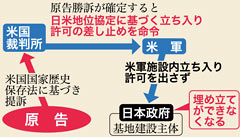Dugong plaintiffs consider new action in U.S. to block Henoko landfill

November 6, 2013 Yugo Okita of the Ryukyu Shimpo
Okinawa dugong plaintiffs are considering filing a new lawsuit in the United States in an attempt to block the landfill in Henoko, Nago. The governments of Japan and the United States plan to build alternative facilities for U.S. Marine Corps Air Station Futenma at Henoko. The lawsuit aims to make the U.S. government stop the Japanese government from entering the area for the reclamation work. The National Historic Preservation Act (NHPA) of the United States requires its government to protect cultural heritage around the world. If the government’s actions could affect cultural assets in other countries it must take that impact into account.
Based on this law, the plaintiffs are taking action against the U.S. Defense Department in the U.S. District Court in San Francisco in order to protect the dugong as an endangered species. They are requesting that the U.S. Defense Department intervene to stop the Japanese government from going into the U.S. military facilities to construct the new air base.
The plaintiffs, including the Okinawa dugong and three Japanese citizens, as well as six Japanese and American environmental associations have brought another action against Secretary of Defense and the United States Department of Defense for violations of the National Historic Preservation Act. They allege that the defendants approved plans for construction of the Futenma replacement facility without taking into account the effect of the construction of the military facility on the Okinawa dugong, which is a marine mammal of cultural and historical significance to the Japanese people.
The timing of the lawsuit will be decided if the Governor of Okinawa approves the landfill application or if the government seeks execution by proxy in the case that the governor does not approve it. Lawyer Takaaki Kagohashi, the head of the plaintiff attorneys and representative of the Japan Environmental Lawyers Federation, said, “We have to wait to take action until just before the government starts the construction.” He emphasized that because it falls within the authority of the U.S. government, it is possible that the lawsuit in the United States could stop the Japanese government going ahead with the construction by preventing Japanese officials from entering the site.
The plaintiffs are same environmental groups and individuals who filed the Okinawa dugong lawsuit in 2003, which they effectively won. In the interlocutory decision, the judge decided that the dugong is subject to the National Historic Preservation Act, and that the government not evaluating the impact on the dugong was a violation of the law.
Kagohashi said, “We considered protective measures for the dugong in the previous case, but this new lawsuit aims to block the construction involved in the landfill. The American Environmental Law is very strict when it comes to the destruction of the natural environment. Our chances of victory are better in the United States than in Japan.”
(English translation by T&CT, Mark Ealey)
Pros of buying Viagra online:
Wondering why you should buy Viagra online at all? Okay with your current routine that requires regular visits to your doctor in order to get and renew your prescription? Well, looks like you don’t really know what you’re missing. Read on – there’s more to ordering Viagra over the Internet than meets the eye.
Previous Article:Three winners of Miss Okinawa 2014
Next Article:Okinawan companies take part in Japanese Food Fair in Singapore
[Similar Articles]
- Okinawa dugong plaintiffs file new action in US court to stop construction of air base in Henoko
- Dugong lawsuit appealed to U.S. High Court
- Dugong lawsuit dismissed in San Francisco District Court in favor of U.S. government
- Dugong lawsuit plaintiffs submit brief claiming DoD not consulting local citizens violated NHPA
- US federal appeals court reinstates Okinawa dugong lawsuit, plaintiffs’ argument partly supported
 Webcam(Kokusai Street)
Webcam(Kokusai Street)


